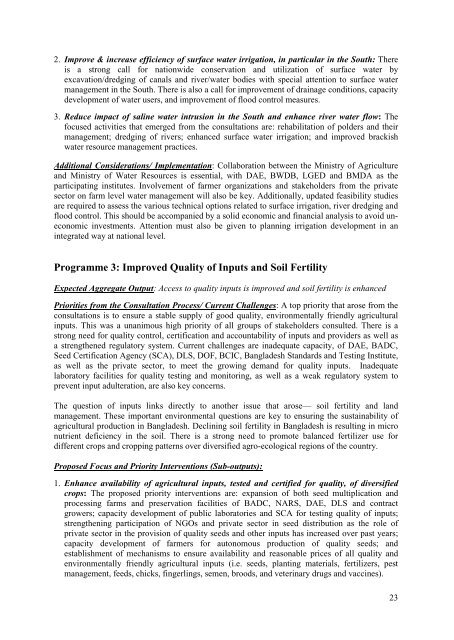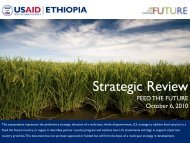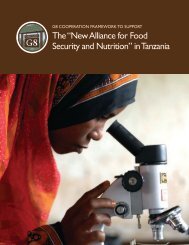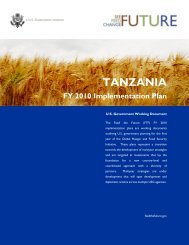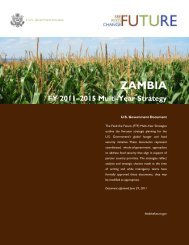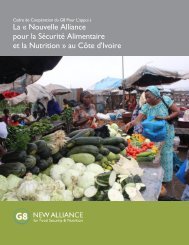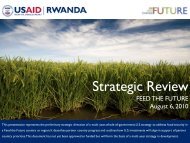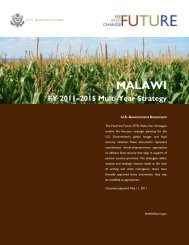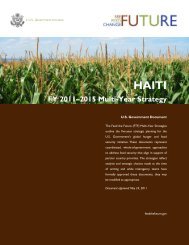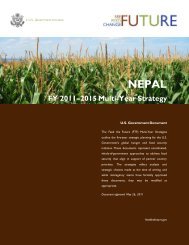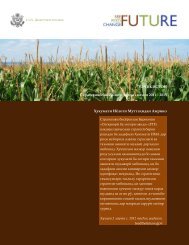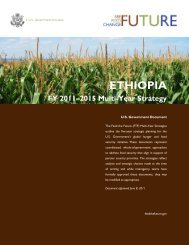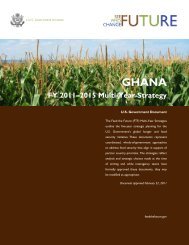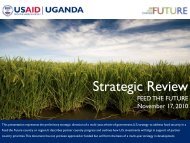Bangladesh Country Investment Plan - Feed the Future
Bangladesh Country Investment Plan - Feed the Future
Bangladesh Country Investment Plan - Feed the Future
You also want an ePaper? Increase the reach of your titles
YUMPU automatically turns print PDFs into web optimized ePapers that Google loves.
2. Improve & increase efficiency of surface water irrigation, in particular in <strong>the</strong> South: There<br />
is a strong call for nationwide conservation and utilization of surface water by<br />
excavation/dredging of canals and river/water bodies with special attention to surface water<br />
management in <strong>the</strong> South. There is also a call for improvement of drainage conditions, capacity<br />
development of water users, and improvement of flood control measures.<br />
3. Reduce impact of saline water intrusion in <strong>the</strong> South and enhance river water flow: The<br />
focused activities that emerged from <strong>the</strong> consultations are: rehabilitation of polders and <strong>the</strong>ir<br />
management; dredging of rivers; enhanced surface water irrigation; and improved brackish<br />
water resource management practices.<br />
Additional Considerations/ Implementation: Collaboration between <strong>the</strong> Ministry of Agriculture<br />
and Ministry of Water Resources is essential, with DAE, BWDB, LGED and BMDA as <strong>the</strong><br />
participating institutes. Involvement of farmer organizations and stakeholders from <strong>the</strong> private<br />
sector on farm level water management will also be key. Additionally, updated feasibility studies<br />
are required to assess <strong>the</strong> various technical options related to surface irrigation, river dredging and<br />
flood control. This should be accompanied by a solid economic and financial analysis to avoid uneconomic<br />
investments. Attention must also be given to planning irrigation development in an<br />
integrated way at national level.<br />
Programme 3: Improved Quality of Inputs and Soil Fertility<br />
Expected Aggregate Output: Access to quality inputs is improved and soil fertility is enhanced<br />
Priorities from <strong>the</strong> Consultation Process/ Current Challenges: A top priority that arose from <strong>the</strong><br />
consultations is to ensure a stable supply of good quality, environmentally friendly agricultural<br />
inputs. This was a unanimous high priority of all groups of stakeholders consulted. There is a<br />
strong need for quality control, certification and accountability of inputs and providers as well as<br />
a streng<strong>the</strong>ned regulatory system. Current challenges are inadequate capacity, of DAE, BADC,<br />
Seed Certification Agency (SCA), DLS, DOF, BCIC, <strong>Bangladesh</strong> Standards and Testing Institute,<br />
as well as <strong>the</strong> private sector, to meet <strong>the</strong> growing demand for quality inputs. Inadequate<br />
laboratory facilities for quality testing and monitoring, as well as a weak regulatory system to<br />
prevent input adulteration, are also key concerns.<br />
The question of inputs links directly to ano<strong>the</strong>r issue that arose— soil fertility and land<br />
management. These important environmental questions are key to ensuring <strong>the</strong> sustainability of<br />
agricultural production in <strong>Bangladesh</strong>. Declining soil fertility in <strong>Bangladesh</strong> is resulting in micro<br />
nutrient deficiency in <strong>the</strong> soil. There is a strong need to promote balanced fertilizer use for<br />
different crops and cropping patterns over diversified agro-ecological regions of <strong>the</strong> country.<br />
Proposed Focus and Priority Interventions (Sub-outputs):<br />
1. Enhance availability of agricultural inputs, tested and certified for quality, of diversified<br />
crops: The proposed priority interventions are: expansion of both seed multiplication and<br />
processing farms and preservation facilities of BADC, NARS, DAE, DLS and contract<br />
growers; capacity development of public laboratories and SCA for testing quality of inputs;<br />
streng<strong>the</strong>ning participation of NGOs and private sector in seed distribution as <strong>the</strong> role of<br />
private sector in <strong>the</strong> provision of quality seeds and o<strong>the</strong>r inputs has increased over past years;<br />
capacity development of farmers for autonomous production of quality seeds; and<br />
establishment of mechanisms to ensure availability and reasonable prices of all quality and<br />
environmentally friendly agricultural inputs (i.e. seeds, planting materials, fertilizers, pest<br />
management, feeds, chicks, fingerlings, semen, broods, and veterinary drugs and vaccines).<br />
23


